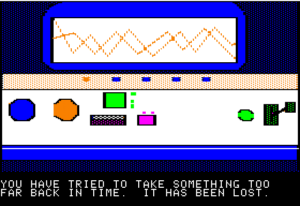Time Zone: Tropes
 One thing, more than anything else bar the graphics, establishes Time Zone as having been written early in the history of the form: although it’s a time-travel game, it lacks the usual time-travel tropes. There are basically two tropes, with sundry variations, pioneered by Infocom in the mid-80’s and almost obligatory since then:
One thing, more than anything else bar the graphics, establishes Time Zone as having been written early in the history of the form: although it’s a time-travel game, it lacks the usual time-travel tropes. There are basically two tropes, with sundry variations, pioneered by Infocom in the mid-80’s and almost obligatory since then:
- Avoiding changing the past. Taking care to clean up anachronisms and/or paradoxes, lest you rupture the space/time continuum. Sorcerer and Spellbreaker both had memorable scenes of this sort, and many time-travel games, including Timequest and Jigsaw, make it the player’s primary goal.
- Deliberately changing the past in order to affect the future: planting acorns so you can climb oak trees a century later and suchlike. Zork III may have been the first game to play with this, but Timequest and Day of the Tentacle are whole games organized around puzzles of this sort. And on the larger scale, changing history is the player character’s chief motivation in Trinity 1Trinity is a peculiar case: by allowing time travel only to sites that are about to be destroyed in nuclear explosions, it manages to avoid the question of whether or not history is mutable until the very end (although there’s some foreshadowing). This narrative device prevents the game from using either trope on a scale smaller than the whole game. and Lost New York.
Time Zone doesn’t do any of that. The time periods are effectively islands, connected only by the fact that you can carry objects between them. And you often can’t even do that: anything that would be anachronistic in the era you’re going to (such as dynamite in 1000 AD, or any manufactured item in the age of reptiles) gets vaporized in transit. So you can’t alter history by leaving ahistorical technology lying around, accidentally or deliberately. More direct alterations, such as assassinating Christopher Columbus, are prevented by the poverty of the game engine: if you try it, you’ll just an error along the lines of “I don’t understand that”.
More broadly, the tropes I speak of (or at least the second one on the the smaller scale) are reliant on non-local effects. Internally, past and future are modelled as separate rooms. For the past to affect the future, you have to have a mechanism whereby an action in one room can affect the state of another. The engine used in the Sierra High-Res Adventures might not in fact have this capability. Judging by the way that some verbs are understood in some areas and not in others, it seems like different areas are in some way treated as separate programs. It seems a little incredible, but having tinkered with the various King’s Quest engines, I can attest that they did something similar, albeit with less noticeable side effects.
On the other hand, maybe it’s just that the author was used to thinking in terms of local effects, because that’s how early adventure games generally worked. The whole idea of non-local effects was a major leap in sophistication for adventure games, arguably more significant than the full-sentence parser. (See the T/SAL “Phoenix” games for examples of what can be done with a two-word parser and a sophisticated world model.)
At any rate, if it’s not doing time-travel puzzles, what is the game doing with all that space? To a large extent, it’s establishing its own tropes. There are certain puzzles that are repeated with different details all over the map:
- Dark tunnels that need a light source
- Dangerous people or animals that, when you enter their location, you have one turn to use the right object to keep them from killing you.
- Merchants and traders who will give you something you need in exchange for a specific other item. (In most cases, they’ll only accept one other item, but won’t tell you which.)
- Expanses of hazardous terrain (either desert or frozen wastes) that you can’t cross without some way of getting food/water/rest/warmth.
Notably, even when two places have identical problems, they’ll have different solutions. The vaporizing of anachronisms, which seemed cheap when I first encountered it, is important to making this work: it provides a general rationale for the solution in 2082 AD not working in 50 BC. I mean, it’s still cheap to bar objects from certain areas by permanently destroying them, rather than by, say, preventing the time machine from launching until you ditch them, or just automatically leaving them behind. But at least there’s some justification to barring them at all.
| ↑1 | Trinity is a peculiar case: by allowing time travel only to sites that are about to be destroyed in nuclear explosions, it manages to avoid the question of whether or not history is mutable until the very end (although there’s some foreshadowing). This narrative device prevents the game from using either trope on a scale smaller than the whole game. |
|---|
 Comments(2)
Comments(2)
[…] writing about Time Zone, Carl Muckenhoupt noted how separated each zone in that game is from all the others, then leaped to […]
[…] writing about Time Zone, Carl Muckenhoupt noted how separated each zone in that game is from all the others, then leaped to […]